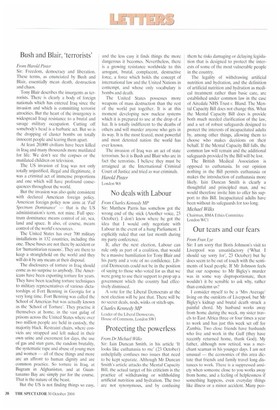Protecting the powerless
From Dr Michael Wilks Sir: lain Duncan Smith, in his article 'It looks like euthanasia to me' (23 October) unhelpfully confuses two issues that need to be kept separate. Although Mr Duncan Smith's article attacks the Mental Capacity Bill, the actual target of his criticism is the practice of withdrawing or withholding artificial nutrition and hydration. The two are not synonymous, and by confusing
them he risks damaging or delaying legislation that is designed to protect the interests of some of the most vulnerable people in the country.
The legality of withdrawing artificial nutrition and hydration, and the definition of artificial nutrition and hydration as medical treatment rather than basic care, are established under common law in the case of Airedale NHS Trust v. Bland. The Mental Capacity Bill does not change this. What the Mental Capacity Bill does is provide both much needed clarification of the law, and a set of robust safeguards designed to protect the interests of incapacitated adults by, among other things, allowing them to choose who makes decisions on their behalf. If the Mental Capacity Bill falls, the common law will remain and the additional safeguards provided by the Bill will be lost.
The British Medical Association is opposed to euthanasia. In our opinion nothing in the Bill permits euthanasia or makes the introduction of euthanasia more likely. lain Duncan Smith is clearly a thoughtful and principled man, and we would therefore invite him to offer his support to this Bill. Incapacitated adults have been without its safeguards for too long.
Michael Wilks
Chairman, BMA Ethics Committee London WCI


















































































































 Previous page
Previous page